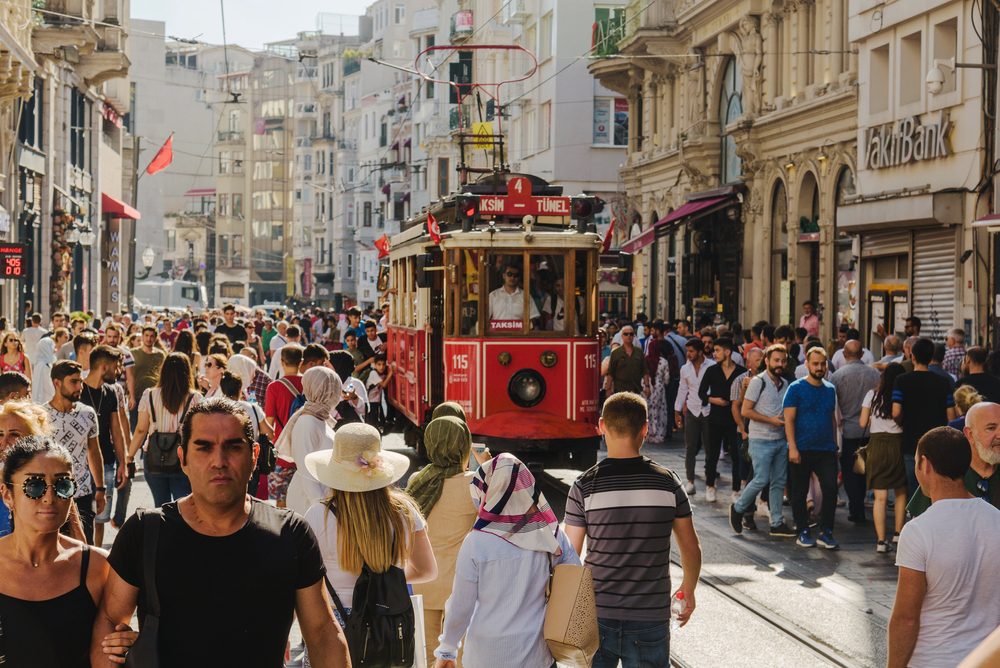
A heavy explosion rocked Istiklal Avenue in Istanbul on Sunday, November 13th. At the time of writing, 6 are confirmed dead and 81 wounded. Turkish President Recep Tayyip Erdoğan announced during a press conference that he sensed it was the work of terrorism and that the event is being investigated as such.
The blast occurred just after 4 p.m. local time in the Beyoglu district, Turkish media report. Quickly thereafter, police, fire, and medical teams rushed to the scene, which was immediately cordoned off. Four of the fatalities died at the scene, while two others died later in hospital.
The district, known as the European part of the Turkish metropolis, is a popular hotspot for entertainment, food, drink, and shopping. During weekends, it (but Istiklal Avenue in particular), is especially crowded, as a throng of shoppers, tourists, and families descend upon it.
Turkish President Recep Tayyip Erdoğan was about to leave for Indonesia to attend the 17th G20 summit when he heard the news. During an impromptu press conference, he said that based on initial information (which suggested that “a woman played a part”), it “smells of terrorism.”
Calling the attack “cowardly,” he vowed that “the culprits will be unmasked,” and “punished as they deserve.” He went on to add that “efforts to seize control of Türkiye and the Turkish nation through terrorism will not yield results.” Five prosecutors have already been assigned to investigate the blast.
Turkish Minister of Health Fahrettin Koca also made a statement. On his Twitter account, he said that “the treatment of the injured continues in our hospitals,” and that he wished “God’s mercy on those who lost their lives,” while offering his best wishes to the injured.
İstiklal caddesindeki patlamada 6 kişi hayatını kaybetti, 53 yaralımız var. İlk müdahaleler olay yerine ulaşan ekiplerce yapıldı. Yaralıların tedavisi hastanelerimizde devam ediyor. Hayatını kaybedenlere Allah’tan rahmet diliyorum, yaralılara geçmiş olsun dileklerimi sunuyorum.
— Dr. Fahrettin Koca (@drfahrettinkoca) November 13, 2022
Meanwhile, photos and videos are circulating on social media. One records the blast itself, causing panic and sending hundreds running; another shows the devastating aftermath.
#BREAKING: Moment of explosion in Taksim Sqaure, Istanbul. Possible bomb attack, bodies seen lying on the ground by eyewitnesses pic.twitter.com/ahrDcCvwXM
— ELINT News (@ELINTNews) November 13, 2022
Bomb explodes in #Taksim Square, heart of busiest touristic venues in #Istanbul and #Turkey.
— Fadi Al-Qadi (@fqadi) November 13, 2022
Authorities haven't yet disclosed casualties.
Horrifying, unacceptable, condemned by all means! pic.twitter.com/dKu6e0mzs2
One other, showing closed-circuit television footage of the street just before the explosion took place, hints at a package containing a bomb had been planted there.
İstanbul / İstiklal Caddesi’nde meydana gelen patlamanın öncesi: pic.twitter.com/GESYd5zL6p
— ibrahim Haskoloğlu (@haskologlu) November 13, 2022
In the past, Turkey had fallen victim to similar deadly bombings. Between 2015 and 2017, it was hit by a wave of them, with the Islamic State group and outlawed Kurdish groups found to be the culprits.
During these events from past years, Turkey’s Supreme Council of Radio and Television imposed temporary bans on Turkish media using close-up videos and photos, so as to avoid fear and panic.
At present, the same protocol is being followed.
The day after the incident, police carried out operations at 21 addresses after inspecting footage from over 1,200 security cameras. At present, Turkish authorities are detaining 46 people, including its prime suspect—a 23-year-old Syrian national called Ahlam Albashir, the person thought to have left the bomb in the bustling street.
On Monday, the Istanbul General Security Directorate released footage of the woman wearing a purple jumper with the words ‘New York’ on it. The directorate reports that she claimed to have taken orders from the PKK/YPG terrorist organisation’s headquarters in the Ayn-al-Arab district in northern Syria.
#Taksim İstiklal Caddesinde meydana gelen Bombalı Terör Saldırısını gerçekleştiren terörist YAKALANDI🚨
— İstanbul Emniyet Müdürlüğü (@istanbul_EGM) November 14, 2022
Olayla ilgili başlatılan çalışmalar çok yönlü olarak devam etmektedir. pic.twitter.com/CniGox6r4u
“If we had not caught the perpetrators, they would have fled to Greece today,” Turkish Interior Minister Suleyman Soylu said when speaking to the press. Noting that the U.S. had offered its condolences, he however did not accept them—presumably over the country’s historical support of the group.
❝Terör saldırısını tertipleyeni de yakaladık.❞
— Süleyman Soylu (@suleymansoylu) November 14, 2022
❝Eğer yakalamasaydık bugün Yunanistan'a kaçacaklardı.❞
❝Amerikan Büyükelçiliği'nin taziye dilemesini kabul etmiyoruz, reddediyoruz.❞
📍#Taksim Basın Açıklaması pic.twitter.com/cRN4a64YmK
Minister Soylu relayed that the order had been given in Kobani, and that the bomber passed through Afrin—both towns in northern Syria where Turkish forces have carried out operations against the YPG in recent years.
In 1980, the PKK launched an insurgency against Turkey to regain control over what it considered Kurdish territory. The PKK, along with its Syrian subsidiary YPG, has been designated a terrorist group by Turkey ever since. While the PKK is considered a terrorist organisation by the EU and the U.S., the latter has made use of, and supported, the group in its fight against ISIL forces in the region.
When a ceasefire between Ankara and the PKK broke down in mid-2015, a string of bombings and other attacks followed. The last major incident, a shooting at a nightclub in Istanbul, occurred in 2017 on New Year’s Eve.
